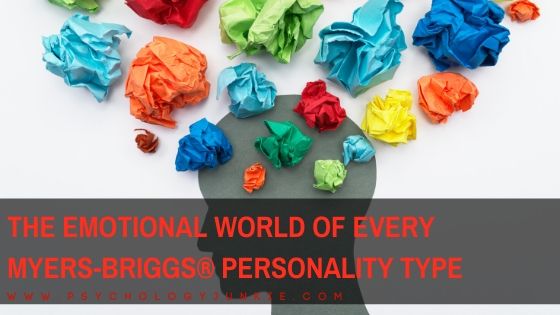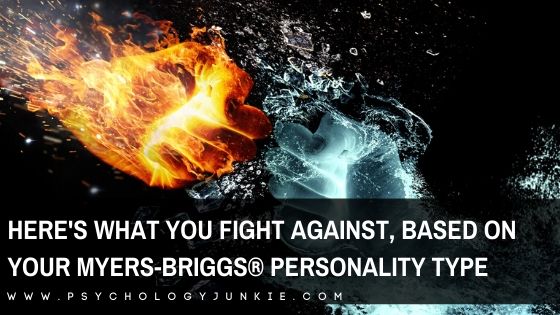The Emotional World of Every Myers-Briggs® Personality Type
Updated June 24th, 2021
Does your personality type have anything to do with your emotions? Many people, especially those who are new to type, connect emotional expression and discernment with a Feeling preference. But is this really accurate? Are feelers more emotional than thinkers? Absolutely not! Every human feels emotions – every personality type can feel them with the same depth and severity. But every one of us will evaluate them using different criteria based on our Myers-Briggs® personality type and our enneagram type. Today we’re going to explore the different ways that each type experiences emotions – keep in mind that your experience might vary based on your Enneagram type, any mental illness you might struggle with, and your life experiences.

Not sure what your personality type is? Take our new personality questionnaire here. Or you can take the official MBTI® here.
Table of contents
Estimated reading time: 14 minutes
The Emotional World of Every Myers-Briggs® Personality Type
The ENFP
Possibility-oriented and caring, ENFPs often feel a need to get alone with their emotions in order to analyze and ascertain their deeper meaning. More engaged with ideas than emotions, ENFPs can feel compelled to ignore their emotions and focus on abstractions and flights of ideas instead. It is usually when they get alone and the outer world quiets down that they realize there’s a deep well of emotional imagery bubbling to life inside of them. They may suddenly realize that they have a strong conviction about something they hadn’t realized before. Depths of longing, ethical evaluations, and emotional imagery fill their minds. This is when they assess whether they’ve spent their day living in accordance with their convictions and deeply-held values. Alone time is an essential part of an ENFPs day because of this reason! Without it, they become more detached from their emotions and values, and may quickly make decisions without realizing their own true position on the subject.
Read This Next: 3 Weird and Wonderful Secrets About the ENFP Personality Type
The ENTP
Creative and competitive, ENTPs are often misrepresented as being “trollish” and confrontational. However, average or healthy ENTPs are much more empathic than people realize. These types are highly aware of the emotional world surrounding them and can pick up on emotional cues quickly and with surprising accuracy. They then assess those emotions with their pattern-seeking mind in order to find possibilities, meaning, and solutions. As a result, ENTPs may realize things about people that those people don’t even realize themselves. When it comes to their own emotions, however, ENTPs can be somewhat blind. It’s much more tempting to focus on the world outside them than the inner world of feelings and emotional evaluations. They may outwardly express emotions without even realizing it as a result (it’s common for them to hear questions like, “Are you upset?” before they even realize they are upset).
Read This Next: The Unique Intelligence of ENFPs, ENTPs, INFPs and INTPs
The INFP
Deep and introspective, INFPs direct most of their conscious energy to discover meaning and achieving inner harmony with their values. They are one of the most emotionally analytical personality types – having depths and complexities to their emotions that others may only briefly glimpse. Many of their deeper emotions find life in stories, causes, and images. For the INFP, emotions aren’t to be worn on their sleeve – they are precious pearls of meaning that they only share with people who have gained their absolute trust. They find a deep spark of happiness when they can bring their values into the outer world through defending a cause, creating art, or finding a community of like-minded individuals.
Read This Next: What it Means to be an INFP Personality Type
The INTP
Truth-seeking and deeply analytical, INTPs expend most of their energy clarifying their thoughts, organizing information in their mind, and seeking logical congruency. They may struggle to fully flesh-out their own emotions and tend to feel overwhelmed in emotionally-charged situations. While the world of troubleshooting and logical analysis is deeply comfortable to them, handling other people’s unpredictable emotions (or their own) can feel intimidating or simply annoying. All this taken into consideration, INTPs seek emotional understanding and harmony in the world around them. They often crave emotional openness and warmth – they just don’t always know how to achieve it. They worry that by sharing their own feelings they’ll be overwhelmed by the emotional reaction of the person they’re sharing it with (this fear is usually created through life experience). As a result, their own feelings can be mysterious to them, and they may only recognize them when they hear a song or read a story that mirrors them.
Read This Next: 3 Weird and Wonderful Secrets About the INTP Personality Type
The ENFJ
Passionate and driven, ENFJs are deeply aware of the emotional worlds surrounding them. They can easily pick up on other people’s moods and feelings and will often structure their environment around the emotional needs of people. However, while they are very in touch with their core values, ENFJs aren’t especially analytical about their own emotional world. They are more outwardly focused than emotionally introspective and are driven towards creating a reality that aligns with their vision of what’s right for humanity. ENFJs may seem like they wear their hearts on their sleeves, and there’s a good reason for this. Inwardly mulling over emotions is usually an exercise in futility for them because they analyze emotions that are outwardly expressed. This is why they may know exactly what their friend is feeling but be blind to their own emotional distress. When they do feel emotionally overwhelmed they will typically seek out a confidante to talk to so that they can “hear” the emotion and then sort it out after it’s been externalized.
Read This Next: A Look Inside the ENFJ Mind
The ENTJ
Visionary and organized, ENTJs are more in touch with logic and impersonal analysis than emotional introspection. That said, in moments of solitude and quiet they may find themselves scanning through their day and picking up on emotions that they didn’t realize at the moment they were feeling. During these moments they can become laser-focused on their ethics, values, and whether or not they lived in accordance with them. This process is often privately experienced, and many outsiders may feel that they really take no time for such things. It can be a surprise to others when, as they grow and mature, the ENTJs feeling-side becomes more obvious. It’s also common for ENTJs to take up a cause for a group that they feel is oppressed, directing their energy stores and vision towards improving the lives of others. They often do this by maximizing the effectiveness of a system that directly benefits their cause (for example, streamlining the effectiveness of a non-profit that fights human trafficking).
The INFJ
Insightful and visionary, INFJs are drawn towards discovering future possibilities and meaning. Often described as deeply-sensitive souls, what might surprise many is that INFJs can be rather out of touch with their own feelings. Because they use extraverted feeling rather than introverted feeling, they are more aware of emotions outside themselves than those inside themselves. When INFJs are emotionally distraught, they tend to search out a way to externalize their feelings in some way. When they verbalize or write down their feelings they can understand them better and discern which feelings are valid and which might be irrational. When feelings stay internalized, INFJs can feel like they’re going to explode with confusion because they are poorly-equipped to analyze internalized feelings – only internalized theories and abstractions. That said, INFJs can be deeply aware of other people’s emotions and even absorb them, getting others’ feelings mixed up with their own. Listening to music is often a powerful way for INFJs to identify with their feelings and process them.
Read This Next: 10 Signs of an Unhealthy INFJ
The INTJ
INTJs direct the majority of their energy inwards, exploring meanings, connections, and patterns that might lead to new insights. And as for their reputation as stoic or unfeeling types, they are actually more deeply feeling than many people realize. Their tertiary function, Introverted Feeling, is directed inwards which results in them having very complex, nuanced inner values. They are more moved by their values and more introspective of their emotional world than many people realize. As they analyze their visions for the future they often will simultaneously tap into the deeper desires and motivations of their heart. In moments of quiet reflection, they will determine whether they’ve lived in alignment with their values and personal ethics. They are also more concerned with the feelings of others than many may realize – keeping a conscientious eye on outliers, underdogs, or oppressed individuals.
Read This Next: What it Means to be an INTJ Personality Type

The ESFP
Warm, charming, and adventurous, ESFPs may not initially seem deeply introspective and emotional. However, underneath their exuberant demeanor, they have a lush internal world of emotional complexity. In their pauses and quiet moments they consider what’s important to them on a gut level, and whether or not they are being authentic and acting in congruency with their deeply-held values. Caring deeply for others, they can become intensely passionate when they feel as though someone has been wronged. They may be the first to stick up for someone who is being bullied or the angriest person in a heated debate about a social position that is close to their heart. Avid activists for personal freedoms and human rights, these types can become deeply emotional about people they feel are marginalized or bullied. In their personal relationships, these types are likely to show their feelings through action more than words – doing things to show their affection more than expressing their feelings verbally.
The ESTP
Persuasive, confident, and action-oriented, ESTPs are the ultimate competitors and realists. These types thrive on interacting with their environment, making things happen, and pulling off creative feats to solve problems and make an impact. Yet besides their charisma and confidence, they have an awareness of the emotional expressions of others. They can quickly pick up on other people’s emotions and have power at wielding the emotional atmosphere to make an impression, to charm, or to empathize with others. They enjoy making people feel comfortable, giving praise, and jumping in to rescue someone who is mistreated or in danger. Their emotions are directed outwards to the people around them, so they can actually be quite expressive of how they feel. They especially enjoy creating solidarity and shared purpose with the people they care about. As far as their own deeper emotions, it can take a while for ESTPs to parse through them. Feelings can strike them as somewhat out of reach and foggy and their emotions may show up more in their facial expressions than in their mind. They tend to enjoy figuring out projects and activities much more than they enjoy analyzing their inner emotional world.
The ISFP
Practical and compassionate, ISFPs continually weigh the situational worth or value of everything happening around and inside of them. These types are deeply introspective and care passionately about specific others; often empathizing with the underdogs, the oppressed, or the misunderstood. Gifted at getting to the heart of people’s personal struggles, they are quick to sense the emotional distance or safety of the people around them. In moments of quiet introspection, ISFPs enjoy delving into their inner world and exploring their values, actions, commitments, and emotions. They analyze whether or not they are living with integrity and alignment with their values and beliefs. The emotional world of the ISFP may not be readily apparent on the outside and they are unlikely to share their deeper emotions unless they are with someone who they trust completely. They may have an immediate emotional reaction to something only to get away to take it out in the physical world in some way – retreating to their room to cry, punch a pillow, or even paint an expression of their emotions on paper.
Read This Next: What it Means to be an ISFP Personality Type
The ISTP
Action-driven and observant, ISTPs are known for their keen problem-solving abilities. When it comes to their emotional world, however, they are often in the dark. Skilled at compartmentalizing, they may stow their emotions away until they can be “of use,” only to find that they never revisit them again. When ISTPs are overtaken by emotion they are likely to try to get away from others, drive in their car, play a video game alone, go to a shooting range, or something similar. Getting their emotional exertion out physically helps them to feel capable rather than overwhelmed. That said, ISTPs are often more aware of other people’s emotions than they realize. They get sparks of intuition about how people are feeling and can often categorize those feelings, but they may not know how to respond to them. This can be a source of insecurity for them in early life, but with time and maturity, they often learn which reactions are met with approval or disapproval. They are more likely to show their deeply-felt emotions through action more than words – shoveling the snow for a loved one rather than writing them a heartfelt note, for example.
Read This Next: The Unique Intelligence of ESFPs, ESTPs, ISTPs, and ISTPs
The ESFJ
Warm, considerate, and down-to-earth, ESFJs seem to exude emotional understanding. They are often the first to give you a warm hug if you’re down, and often the first to grab a box of tissues for someone who is crying. They long to create a sense of intimate oneness with others and they will self-disclose their own feelings, values, and issues in order to create solidarity with someone else. Often wearing their hearts on their sleeves, they consider themselves easy to get to know and enjoy getting to know others deeply. That said, for all their warmth and openness, these types can be relatively oblivious to their own emotions. Their focus can become so outwardly directed that they lose sight of their own feelings. It’s more natural for them to identify emotions outside of themselves than the ones harboring within. They may even take on other people’s emotions, crying when others cry or laughing when others laugh – sometimes without even realizing why.
The ESTJ
Hard-working and motivated, ESTJs strive to achieve goals and create stability for themselves and their loved ones. While their emotions may not seem immediately obvious, they can have moments of deep introspection. When they are alone and their tasks are over they may choose to analyze their feelings, how they’ve been affected by the experiences of the day, or how the people around them are feeling. Their emotions are usually relatively private unless they are extremely stressed. During highly stressful moments they can seem uncharacteristically angry or sensitive, but this usually dissipates quickly as soon as the stress is resolved. While these types might seem all about logic and objectivity, they are more passionate about certain causes than many people realize – especially as they get older. They desire to live a life that benefits the world in some way. Determined to make a difference, they are often drawn towards causes that touch their hearts. Whether those causes are political, religious, humanitarian, or otherwise, they will usually find a way to help those causes through their thinking power. Organizing projects, solving problems, and raising money for their causes will usually be the way they show their dedication.
The ISFJ
Conscientious and dedicated, ISFJs often exude warmth and compassion. These types easily pick up on the emotional cues of the people around them and work to create a sense of harmony and comfort. It’s important to them that people feel at ease in their presence, even if they have to make self-deprecating jokes or reveal their own flaws to make someone else feel comfortable. Reflective and considerate, they often explore their emotions through journaling or a one-on-one conversation with a close friend. They also might analyze their emotions as they watch movies or listen to songs that mirror their current emotional state. They often have favorite songs, movies, or books that they befriend when they are experiencing particular emotions or moods. Attending to other people emotionally and physically is something they often prioritize. In fact, they may often prioritize other people’s emotions and well-being more than they prioritize their own.
Read This Next: What it Means to be an ISFJ Personality Type
The ISTJ
Sensible and detail-oriented, ISTJs are masters of logistics and organization. They are often touted for their dependable nature and systematic way of accomplishing things, but what many people don’t take into account is their emotional world. ISTJs have deeply-held values and feel very strongly when they are faced with something that aligns with or against their moral code. Their deep determination to be dependable, to take care of their communities, to do their best at their job – all these things stem from their innate desire to live up to their inner values. While these types might seem somewhat aloof and stoic to many (especially non-family members), they actually have very strongly-held values and emotional ties to loved ones and to meaningful memories and traditions. In later life many ISTJs feel compelled to shepherd others towards the values that are significant to them. In younger life, they may have a little less desire to do this and can be a little more out of synch with their emotional world.
Read This Next: 5 Strengths of the ISTJ Personality Type
What Are Your Thoughts?
Do you agree with this article or disagree? Let us know your insights and thoughts in the comments!
Find out more about your personality type in our eBooks, Discovering You: Unlocking the Power of Personality Type, The INFJ – Understanding the Mystic, and The INFP – Understanding the Dreamer. You can also connect with me via Facebook, Instagram, or Twitter!















NiFe (INFJ) 9w1-5w6-2w1 so/sx IEI RLOAI LEVF Melancholic-Phlegmatic:
I know that along with music and talking about stuff online, I usually use characters whom I find extremely resonant to me both in the way they operate and the things they go through (most are INFJs, but a couple of INTJs and INTPs too). It’s sort of a way to see myself and feel validated for having feelings which most of the time I feel are a burden or inconvenience to everyone somehow or just don’t make sense to have.
Some are Izuku Midoriya, Satoru Fujinuma, Kenshin Himura, Yuki Sōma
I notice that through Ni-Ti (not the looping but just general usage, although if I’m in a really terrible state it can go there too) I am able to sort of rationalise or understand my emotions in a sort of logical way but I don’t end up accepting them or being self-compassionate and sometimes it devolves into brutal self-criticism.
“… what might surprise many is that INFJs can be rather out of touch with their own feelings.” So very true! I’ve always wondered why I have that ability (sometimes rather annoying) to experience other’s emotions but find it very trying to dissect my own deep feelings.
Over the years, developments in various situations showed my emotions about them to be on point at least 95% – but almost always after the fact. Maturity made me realize I erred because I “listened” only to the overall utterance of my emotions about complex matters. It seemed certain that God had blessed me with a good natural, in-built “warning system” but understanding its mechanics was needful in order to have the benefit of foresight. The few errors caused overthinking which made me search my emotions and enabled me to see the need to always actively “listen” to the voice of each emotion. Needless to say, to be wary of the ease of making assumptions when seemingly insignificant variables in a situation are missing but to patiently “sit on the fence” until whenever they are revealed.
If only I’d known this was an INFJ trait and could have seen into the future that Susan Storm had amazingly helpful information on this!
As it requires effort to tackle my emotions, especially in complex or hurtful matters, firstly, I try to identify the voice of each emotion in the tumble of emotions. This is by figuring out whether they are triggers; whether based on my/others’ previous experiences; whether there are rationale inhibitors such as resentfulness, hurt, envy even (though not naturally envious); whether there is undue influence from others; whether I am fatigued or ill, etc.
While it is occasionally sufficient to simply go deep into my head to dissect a complex tumble of emotions, it is usually necessary to write about what occurred, expressing the dominant emotions to make their intrusion into my thoughts much less inhibiting.
Having then determined what the emotions are, the next step usually is to figure out what each emotion has to do with the other (likened to looking at the placement of items seen in a painting), and whether all the emotions are relevant to the situation (likened to contemplating whether all the items seen in the painting add to, detract from, or are neutral to its theme).
I hope this is helpful to someone and it would be good to see how others cope with this trait.
I feel very understood and probably validated right now because of how accurate that description of an INTJ’s relationship with emotions was. (Well, to be completely honest, I know that I feel positive emotions, and I am guessing at the specifics based on general impressions of personal experiences with similar emotions in the past, a little bit of research I did about emotions, and the question of “How would I feel right now, considering my backstory?”.) I appreciate the time and energy you put into understanding the different personality types as people rather than stereotypes.
-INTJ